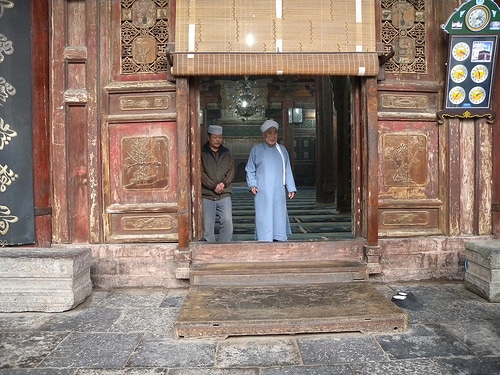While it may seem counterintuitive, the most interesting moments of my research—at least retrospectively—occur when my informants, the subjects of my field study, comment crassly on sensitive American issues. It is during these moments that I must delicately balance between maintaining neutral as an ethnographer and my desire to dispense a positive image of America, the core of the Fulbright mission.
Most commonly, are the conspiracy theories about September 11th proposed by my informants. Last month, a Guangzhou-based Farsi translator from Urumqi argued that the holding company of the twin towers would have wanted to collapse the buildings to recoup the loss on their investment through an insurance payment. Last weekend, a frail Cantonese Muslim woman explained, in awkward Mandarin, that America should have known to use water to prevent the collapse of the towers.
By now, I am likely equipped to write a book on the contortions of the reality of 9/11 in the Chinese Muslim imagination. While those propositions try my ethnographic serenity, almost twelve insulating years separate me from the atrocities of the 2001 attack.
I recently experienced another such moment after the Boston Bombing while out in the field in a Muslim quarter of Guangzhou.
I had just completed my own first marathon in January and was all too intensely aware of the participation of some of my best friends in the Boston event—I had, just a few days before the bombing, made a series of online donations to my friends’ fundraising efforts.
Indeed, I should have known to take more than one mental health day of rest from my fieldwork after the news of the Boston atrocities roused me out of my pollution-induced mental fog on that April morning.
When I finally had the mental strength to venture beyond the Starbucks on my block and into the urban expanse of Guangzhou, I headed to work: to the Haopan Mosque—an oasis from the crowds, heat and stench of Yuexiu district.
The imam, one of my closest informants in Guangzhou, the only one I would consider a friend, took the liberty to start the conversation.
“There was a bombing in Boston.”
“Yes,” I confirmed.
“These things do not happen in China; we have our problems, but we do not have bombings. This is just more proof that our country is better run.”
“Yes,” I ingratiated him, resisting the urge to divulge my knowledge about the acts of terror that frequently plague Xinjiang Province but are handily hushed or distorted in favor of the state.
“Do they know who did it?”
“Not yet,” I said.
Already, Imam Zhang had used the event as an opportunity to glorify China.
My arctic terseness halted the conversation.
Over the next few days, I witnessed the chilling progression of events that concluded with the successful capture of the second brother. I was cemented to the Internet the whole time.
That Sunday, I attended a festival at Guangzhou’s Huaisheng Mosque which is often considered China’s oldest mosque. Although not decisively proven by the archives, the state posits that the mosque’s minaret has not been substantively renovated since the Tang Dyasty, which would make it the only Tang stone structure still standing.
Beckoned into the generously air conditioned office by another imam, I had hardly settled into my piping cup of tieguanyin tea before he mentioned Boston.
“Chechnyan brothers,” I reported.
“Muslims?” He asked.
“Yes,” I responded. “Well, at least that is what their Russian social networking pages claimed.”
“Chechnyan brothers or whatever,” the imam snapped. “Whoever the American government points to is whoever did this—that is just how things work. And, as I’ve always said, you Americans are smart. You chose to blame a white Muslim so that it is not just another Arab attack on America. This is going to come off as an attack attributable only to Islam itself.”
“There are videos,” I interrupted. “The brothers’ culpability is very uncontroversial.”
“Videos! That is nothing; even I can make a video.”
Instead of arguing the obvious—well, at least I think of it as self-evident—that the attack had nothing to do with the theological compulsions of Islam itself, the imam’s argumentative strategy was to discard the trustworthiness of the US government.
Upset, I avoided making eye contact and found myself gazing at the Huaisheng Mosque’s timeless minaret, which, even in my disorienting anger, struck me as a humbling testament to the enduring beauty and spiritual integrity of Islam.
And the whole discussion suddenly seemed more than just offensive—it became just plain petty.
The imam had devolved into a finger-pointing conspiracy theorist. I was shocked. He was a spokesperson of an enduring religion that campaigns for human solidarity and advancement and one of the world’s great monuments to the power of faith. He was highly educated, a graduate of a top Islamic school in China. He spoke proficient Arabic and some English and spent most of his time watching or reading world news.
We could have had a productive conversation about what Islam might have to say about such a tragedy. Instead, he left me wounded and speechless.
With the numbing insulation of retrospection, however, that day of fundamental disagreement stands as one of the most intellectually memorable and stimulating of my year, as it revealed the imam’s underlying, if misled, conception of America.


